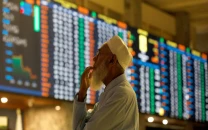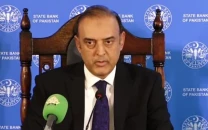Pakistan secures $1b loan from two Middle Eastern banks
Finance minister Muhammad Aurangzeb confirms news during an interview at the World Economic Forum's annual meeting.

Finance Minister Muhammad Aurangzeb announced on Tuesday that Pakistan has finalised terms for a $1 billion loan from two Middle Eastern banks, marking another step in the country’s efforts to secure much-needed financing.
The loans, agreed at an interest rate of 6-7%, were confirmed during an interview at the World Economic Forum's annual meeting. Aurangzeb revealed that the agreements include one bilateral loan and one trade financing arrangement, both with a short-term tenure of up to one year.
This is part of Pakistan's broader plan to raise $4 billion from Middle Eastern commercial banks by the next fiscal year, as previously stated by State Bank of Pakistan Governor Jameel Ahmad.
Aurangzeb expressed optimism about Pakistan’s economic trajectory, highlighting plans to engage with credit rating agencies for a potential upgrade to a single B rating. “Ideally, I would like to think some action in this direction can take place before our fiscal year ends in June,” he said.
Currently rated in “junk” territory, Pakistan saw slight improvements earlier this year when Moody’s upgraded its rating to Caa2 in August, citing better macroeconomic conditions. Similarly, Fitch raised its rating to CCC+ in July following a staff-level agreement with the International Monetary Fund (IMF).
Pakistan is looking to bolster its finances under the $7 billion IMF Extended Fund Facility (EFF) secured in September 2024. The first review of the program is scheduled for late February 2025, with Aurangzeb optimistic about meeting the requirements.
The government also requested $1 billion from the IMF’s Resilience and Sustainability Trust (RST) in October for climate-related initiatives. Discussions are expected to advance during the upcoming IMF mission. “I’m hoping in the next six to nine months, we can get there with the Fund as well,” Aurangzeb said.
Aurangzeb also addressed plans to revive Pakistan International Airlines (PIA) through privatization. After a failed attempt last year to offload a 60% stake in the debt-laden carrier, he anticipates progress in the next five to six months.
This comes as the EU recently lifted its 4.5-year ban on PIA, allowing flights to Europe to resume, signaling improved business prospects.
Given Pakistan’s vulnerability to climate change, the government aims to leverage the RST for projects focused on adaptation and transitioning to clean energy. The program offers concessional financing to address long-term climate challenges.
With the IMF review and financial arrangements in motion, Pakistan remains focused on stabilising its economy while addressing structural weaknesses. However, challenges in privatisation, credit rating improvements, and climate financing continue to test the government's resolve.























COMMENTS (1)
Comments are moderated and generally will be posted if they are on-topic and not abusive.
For more information, please see our Comments FAQ